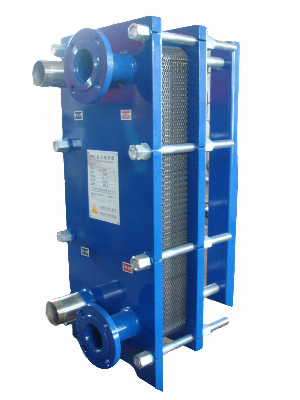Plate Heat Exchanger for Swimming Pool Constant Temperature
Product DescriptionThe plate heat exchanger is a new efficient and
compact heat exchanger that has developed and extensively used in
recent decades. It consists of multiple parallel corrugated-surface
thin metal sheets that overlap and are then fixed by lamp plates
and bolts. The cold working fluid and the hot working fluid flow
through the narrow and winding passage made of two neighboring
plates alternately and realize cold and heat exchange through the
plates separating the two working fluids. StructureThe plate
heat exchanger consists essentially of heat transfer plates,
gaskets and a clamping device. Thanks to its structure and heat
exchange principle, it is characterized by compact structure, small
floor area, high heat transfer coefficient and operation
flexibility, wide application range, small heat loss, easy
installation and cleaning, etc. The two mediums have a mean
temperature difference as small as 1ºC and heat recovery efficiency
higher than 99 percent. Based on the same pressure loss, the plate
heat exchanger has, compared with a tubular heat exchanger, a heat
transfer coefficient two to four times higher, a one-third floor
area and two-thirds metal consumption. It is therefore an efficient
and energy, material and investment saving advanced heat exchanger.
It is now widely used in industrial fields such as chemical
industry, petrochemical, food, machinery, central heating,
metallurgy, power, ships, paper-making, textile, pharmaceutical
industry, nuclear industry, seawater desalination and combined heat
and power generation to meet the requirements of processes such as
cooling, heating, condensation, concentration, sterilization and
residual heat recovery. It has become a highly competitive product
in the heat exchanger field or evenly has replaced conventional
tubular heat exchangers. With its development, it will be used in
more and more fields. Product ParametersPlate and gasketThe
plate materials and the gasket materials mainly depend on the
corrosive properties and temperatures of the cold exchange medium
and the heat exchange medium. The plate heat exchanger's plate
materials and corresponding applicable places are given in Table 1
and its gasket materials and corresponding applicable places in
Table 2 for your reference.Table 1 Plate Materials Material
nameThickness (mm)Material gradeApplicable placeStainless
steel0.5-0.8304,321,316,316LPlaces with serious corrosion caused by
acid or base mediums and places not suitable for chloride
ionsCommercial pure titanium0.5-0.8TiAlkali or salt making places,
sea water desalination places, low-temperature places, freezing
places or places with chloride-ion corrosionNickel0.5-0.8NiPlaces
resistant to corrosion, hot alkali liquor corrosion, neutral
solutions or subacid solutionsAcid-resistant steel0.5-0.8RS-2,
SM0254, HC-276Sulfuric acid field and the fields with acid
corrosionTable 2 Gasket Materials Material nameCodeApplicable
temperatureApplicable placeNBRN-20~110ºCWater, non-polar oil,
mineral oil, lubricating oil, silicon oil, etc.EPDME-20~150ºCSteam,
water, ozone, polar chemical mediums, alcohol, weak acids, weak
bases, salt solutions, etc.Chloroprene rubberC-40~100ºCAmmonia,
mineral roil, lubricant, freon, etc.FluororubberF0~180ºCInorganic
acids, bases, mineral oil, halohydrocarbon and oxidantSilicon
rubberQ-40~200ºCFood field, etc.Our factory:Company
Profile /* March 10, 2023 17:59:20
*/!function(){function s(e,r){var
a,o={};try{e&&e.split(",").forEach(function(e,t){e&&(a=e.match(/(.*?):(.*)$/))&&1
Related products about Basic Customization Plate Heat Exchanger for Swimming Pool Constant Temperature
-
 Waste Tyre Plastic Recycling Machinery Machine Tire Crusher Production Line Rubber Crumb Grinding Machine Equipment Tire Shredder
Waste Tyre Plastic Recycling Machinery Machine Tire Crusher Production Line Rubber Crumb Grinding Machine Equipment Tire Shredder
-
 Stretch Plastic Blowing Pet Bottle Making Blow Molding Machine Bottles Stretch Automatic Pet Bottle Blowing Machine
Stretch Plastic Blowing Pet Bottle Making Blow Molding Machine Bottles Stretch Automatic Pet Bottle Blowing Machine
-
 Waste Plastic Pet Bottle, Water Bottle Flake, PP/HDPE/LDPE PE Film Jumbo Woven Bags Plastic Crusher Machine, Plastic Crushing Washing Recycling Machine
Waste Plastic Pet Bottle, Water Bottle Flake, PP/HDPE/LDPE PE Film Jumbo Woven Bags Plastic Crusher Machine, Plastic Crushing Washing Recycling Machine
-
 Type 2 Wall-Mounted Electric Car Charging Station 7kw /11 Kwelectric Vehicle Charging Station Home Wallbox AC EV Charger Single Phase or 3three Phase
Type 2 Wall-Mounted Electric Car Charging Station 7kw /11 Kwelectric Vehicle Charging Station Home Wallbox AC EV Charger Single Phase or 3three Phase
-
 G-View G12W Wholesale Auto Car LED Headlight Bulb High Power H13 H11 9005 H7 H4 Car LED Headlights LED Car Lights
G-View G12W Wholesale Auto Car LED Headlight Bulb High Power H13 H11 9005 H7 H4 Car LED Headlights LED Car Lights
-
 New Design Porcelain Round Plates Dinner Set for Wedding and Banquet
New Design Porcelain Round Plates Dinner Set for Wedding and Banquet
-
 China 2023 New Design Super Soft 100% Polyester Microfiber Knitted Oversized Decoration Hoodie Blanket
China 2023 New Design Super Soft 100% Polyester Microfiber Knitted Oversized Decoration Hoodie Blanket
-
 Handmade Art Creative Materials Thickened White Paper Cup DIY Disposable Handmade Colored Paper Cup
Handmade Art Creative Materials Thickened White Paper Cup DIY Disposable Handmade Colored Paper Cup



